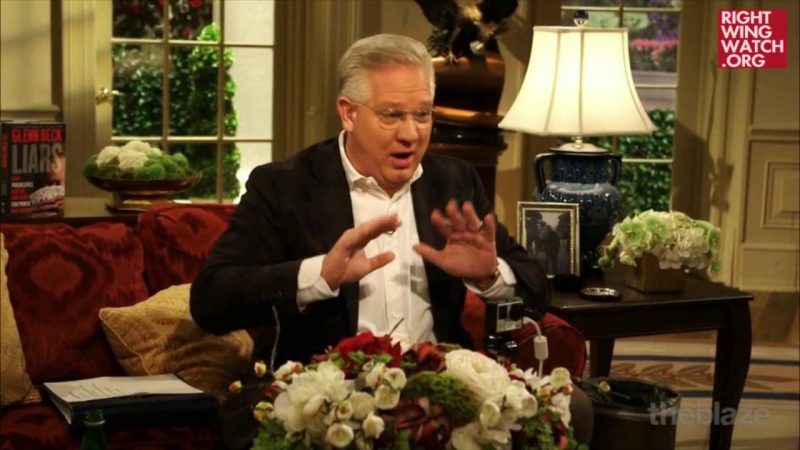Yesterday, the federal judge overseeing the defamation lawsuit filed against Glenn Beck by Abdul Rahman Ali Alharbi, who was injured in the Boston Marathon bombing and whom Beck spent a month accusing of being an al-Qaida “control agent” and the “money man” who financed and orchestrated the attack, issued a ruling ordering Beck to identify the confidential sources that he relied on when making these claims so that Alharbi’s lawyers can depose them:
U.S. District Court Judge Patti Saris ruled that Beck must disclose the names of two Department of Homeland Security employees who allegedly gave a Beck producer information backing up the radio and TV host’s claim that Alharbi was the “money man” behind the attack.
The judge said deposition testimony from Beck and two of his top deputies at the time — Joel Cheatwood and Joe Weasel — was “vague and often contradictory” about what the sources said and when they said it. She also noted that the key sources spoke directly only with Weasel, who claimed to record the information on Post-It notes “which he then discarded.”
Saris said she ordered the production of records from several government agencies, but they were not of help in confirming what the Beck aides were allegedly told. “None of the documents supports the idea that Alharbi was the ‘the money man’ financing the Boston Marathon attacks,” the Boston-based judge wrote in her 61-page ruling.
As the judge’s ruling makes clear, there is no evidence to back up Beck’s assertion that Alharbi was “the money man” behind the bombing other than the say-so of Beck’s confidential sources. And that is bad news for Beck, as the judge also dismissed his legal team’s effort to assert that Alharbi was a “limited-purpose public figure,” which would have required Alharbi to prove that Beck knew that the allegations that he was making against Alharbi were false or that he made them with reckless disregard for the truth. Instead, the judge ruled that Alharbi was merely a private figure who was thrust into the news by events beyond his control and therefore he simply needs to prove that Beck was negligent in leveling these public allegations.
And, according to the judge, Alharbi looks to have a strong case since Beck’s legal team was unable to produce any documentation to support Beck’s claim that Alharbi financed and orchestrated the terrorist bombing, which he continued to make long after claims about Alharbi’s involvement in the attack had been debunked by the government, investigators and even reporters from Beck’s own network:
As a private figure, Alharbi is only required to prove negligence as opposed to malice. See Ravnikar, 782 N.E.2d at 510-11. Under the negligence standard, “the defendants are required to act reasonably in checking on the truth or falsity of the communication before publishing it.” Jones v. Taibbi, 512 N.E.2d 260, 269 (Mass. 1987) (internal quotation marks and alterations omitted). At this stage, the plaintiff has put forward enough evidence for a reasonable jury to conclude that the defendants did not act reasonably in verifying the truth of the broadcasts about Alharbi, particularly the May 8 statement that Alharbi was the “money man.”
To begin with, the defendants have put forth no admissible evidence that the statements are true. At the summary judgment hearing, the plaintiff highlighted an email from Weasel to Cheatwood on April 22, which states that another staff member of TheBlaze, Sara Carter, was “getting a very different picture” about Alharbi’s connection to the Boston Marathon bombing from her sources. Weasel Decl., Docket No. 117, Ex. 18, at 84. According to Weasel, Carter reached out to the FBI and ICE on the record to ask about the plaintiff’s involvement and the government documents provided by Source 2. Her sources allegedly responded that “Alharbi is considered innocent and not connected to the bombings or the suspects.” Id. at 85. Her sources also corroborated Secretary Napolitano’s testimony that Alharbi was temporarily placed on the terror watch list as a “precaution” before the government “determined whether he was more than a witness from the scene of the crime.” Id. at 84.
According to the defendants, TheBlaze’s determination that Alharbi was involved in the Boston Marathon bombing was ultimately based on the two government documents they received from Source 2, and Source 1’s and 2’s explanation of these documents. The documents themselves are dated April 15 and 16, and the defendants agree that they were created in the immediate aftermath of the bombing. Although the documents refer to Alharbi as a “suspected terrorist,” who is “armed & dangerous,” and mention the § 212(a)(3)(B)(i)(II) designation, they do not say anything about Alharbi being the “money man” or otherwise funding the attacks.
When asked specifics about what Sources 1 and 2 told the defendants at his deposition, Weasel testified that the sources did not explain when the alleged financing took place, how any funds were transferred, the amounts of financing, what the financing was used for, or how the financing was otherwise accomplished. See Weasel Dep., Docket No. 109, Ex. H, at 160. Thus, the plaintiff has put forward enough evidence to demonstrate a genuine issue with respect to whether the defendants were negligent.






